1 动名词作主语
Talking mends no holes.空谈无济于事。
Seeing is believing.
眼见为实。
Having done the work in an experience you’ll never forget.
做过这种工作,就会使你永生难忘。
动名词作主语时,谓语动词一律用单数。详见上三例。
1.用It 作形式主语
用动名词作主语时,和动词不定式一样,有时也用It 作形式主语。
It is no use(useless) talking too much.
=Talking too much is no use(useless).
说得太多了没有用处。
It’s no good crying.
=Crying is no good.
哭没什么好处。
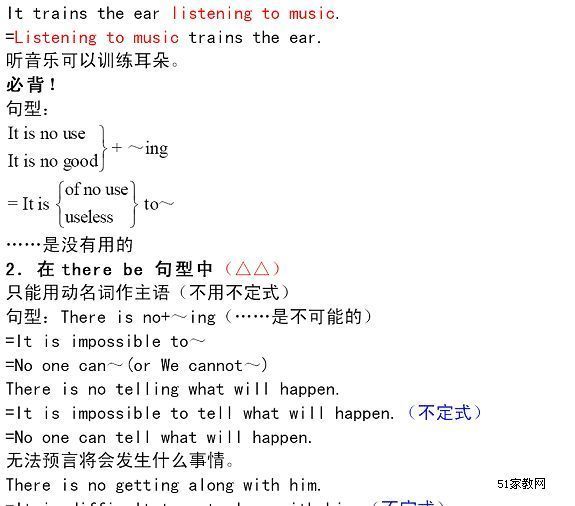
=It is difficult to get along with him.(不定式)
他这个人很难相处。
2 动名词作表语
主语 动词 表语His hobby is painting.
我的爱好是绘画。
What he likes best is making jokes.

点:
a.动名词更接近于名词,所表示的动作比较抽象,或者是习惯性的,
而不定式多表示某次比较具体的动作,特别是将来的动作。
His hobby is painting.(动名词)
他的爱好是绘画。
In summer what he wants to do is to paint.(不定式)
在夏天,他想要做的就是绘画。
b.在口语中和疑问句中,常用动名词,而不用不定式。
Does your saying that mean anything to him?
你说这话对他能起作用吗?
惯用语
c.It is no use(good)doing sth.(⋯⋯是没有用的)
It is important/necessary /advisable⋯to do sth.
★但是It’s no use (good)to do sth 并不是错的,有时也可以用,尤其是指具体的情况时。
It’s no use to ask the teacher. He has no idea of it.
关于这件事问这个老师也没用,他对这件事一点也不知道。
一般情况下,尤其是在中学阶段,It’s no use(good)后面用动名词的情况是绝大多数。
It is no good being a liar.
说谎是没有好处的。
It’s no good learning English words by heart without knowing how to use them.
光死记英语单词而不懂如何运用不是好方法。
It’s no use crying over spilt milk.
注意
某些成语和句型有严格要求,一定要用动名词。
覆水难收。
It’s very important to attend meetings.
参加会议很重要。
It’s advisable to work out a plan before we start to work.
应该在开始工作之前制订一个计划。
4 动名词作宾语
Our monitor suggested having a discussion of this subject.我们的班长建议讨论这个题目。
The rain prevented us from going out.
由于下雨,我们没有出去。
动名词可以作动词的宾语,也可作介词的宾语。有些动词后只能跟动名词作它的宾语,而有些动词后面只能用不定式作它的宾语,而有的动词则动名词、不定式都可以作它的宾语,且区别不大,有的则区别很大。
1.只能用动名词作宾语的动词和词组
advise 建议 allow 允许 resist 抵抗
admit 承认 escape 逃脱 risk 冒险
avoid 避免 forgive 原谅 suggest 建议
consider 考虑 imagine 想像 understand 了解
delay 耽误 mind 介意 appreciate 感谢,欣赏
enjoy 喜欢 keep 保持 can’t help doing sth.情不
自禁
excuse 原谅 miss 错过 put off 推迟
finish 完成 practise 练习 give up 放弃
deny 否认 prevent 阻挡,阻止
I can’t imagine doing that with them.
我不能想像和他们在一起做那件事。
She denied making a mistake.
她否认犯了一个错误。
You must try your best to avoid meeting him in that street.
你必须尽量设法避免在那条街上遇见他。
When I heard his vice, I couldn’t help thinking of my father.
当我听到他的声音时,我不禁想起了我的爸爸。
The doctor advised me giving up smoking and drinking.
医生劝我戒烟和酒。
You’d better put off having the meeting next month.
你最好把这个会议推到下个月。
2.在介词后面作宾语
动名词跟在一些固定的词组后作宾语。
insist on 坚持 excuse⋯for 为⋯⋯而原谅
think of 想到 devote⋯to 把⋯⋯贡献
look forward to 盼望 know of 对⋯⋯了解
be(get)used to 习惯于 set about 动手去做⋯⋯
be proud of 为⋯⋯自豪,骄傲 spend⋯in 在⋯⋯花费
be succeed in 在⋯⋯成功 spend⋯(in)doing sth. 花⋯⋯做某事
be fond of 喜欢 be busy(in)doing(sth)忙于做某事
be good at 擅长于⋯⋯ be afraid of 为⋯⋯而害怕
be interested in 对⋯⋯感兴趣 be tired of 厌烦⋯⋯
dream of 梦想 be sick of 对⋯⋯感到恶心
hear of 听说 be ashamed of 为⋯⋯感到喜悦
prevent⋯from 避免 add to 加上
keep⋯from 避免 lead to 导致
stop⋯from 避免 get to 开始
be engaged in 从事于 come to 谈到
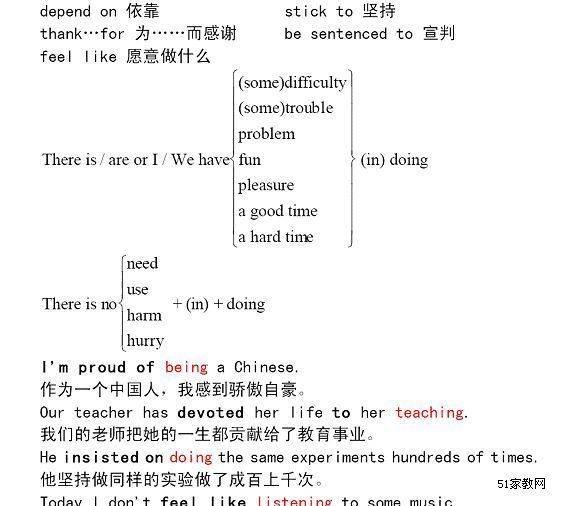
Today I don’t feel like listening to some music.
今天我不愿意听音乐。
On hearing his boss’ voice, he turned off the switch at once.
他一听见他老板的声音,立刻把开关关了。
Before leaving here please call me.
离开这儿之前,请给我打电话。
I know the way of working out the problem.
我知道解这道题的思路。
I have some difficulty(in)finding out when the trainleaves.
在弄清这辆火车何时开车这个问题上遇到些困难。
We had a good time(in)celebrating his birthday.
庆祝他的生日,我们玩得很愉快。
There is no harm(in)pointing out his mistakes.
指出他的错误来对他没什么害处。
We spent two weeks(in) visiting the city.
我们花费了二周参观这座城市。
Now they are busy(in)preparing their lessons.
比较
Now they are busy with their lessons.
在些句型中with 后只能跟名词或代词,如果跟动名词则用be busy(in)doing sth.’ in 常常省略。
现在他们正忙于准备他们的功课。
3.动名词和不定式均可作宾语且区别不大者
常见于continue, begin, start 这些动词
After finishing his composition he continued reading(toread)a novel.
完成了作文之后,他继续读一本小说。
They usually begin to work(working)at nine in the morning.
他们通常是上午九点钟开始工作。
I prefer making(to make)a plan before I go over our lessons.
我在复习功课之前宁愿做一个计划。
4.动名词和不定式均可作宾语且有些区别者
常见于like, hate, learn, prefer, love⋯这些动词
I like skating. But I don’t like to skate today.
我喜欢滑冰,但是我今天不想去滑冰。
(like skating 是指一贯的、习惯性的爱好,而like to skate 是指暂时的动作。)
比较
She hates to smoke before other people.
她不喜欢在别人面前吸烟。
(不定式的逻辑主语是she,是指她吸烟)
She hates smoking.
她不喜欢吸烟。
(动名词的逻辑主语不只是句子的主语she,还有别的人)
比较
The girl has learned to cook.
这个小姑娘已经学会做饭了。(现在会做饭)
The girl has learned cooking.
这个小姑娘过做饭(现在可能做得好,也许不太好)
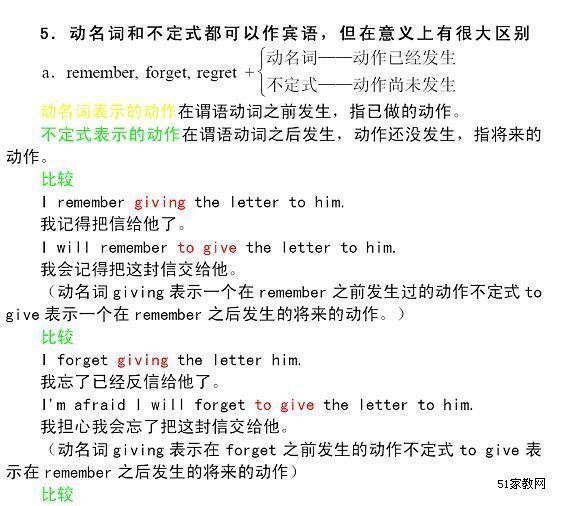
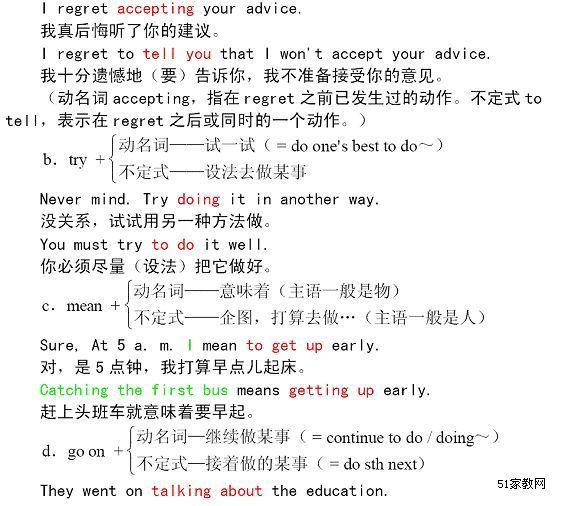
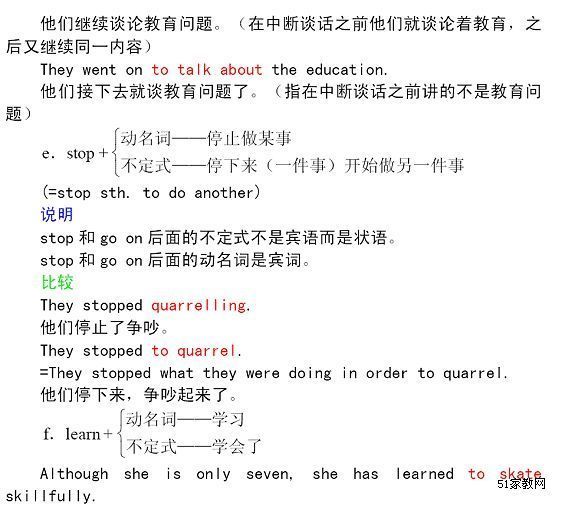

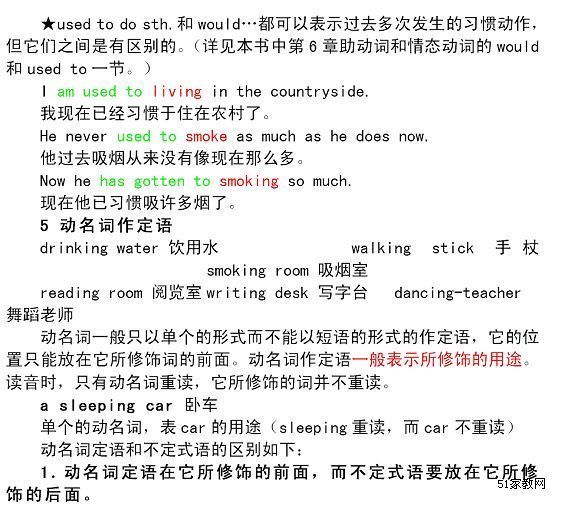
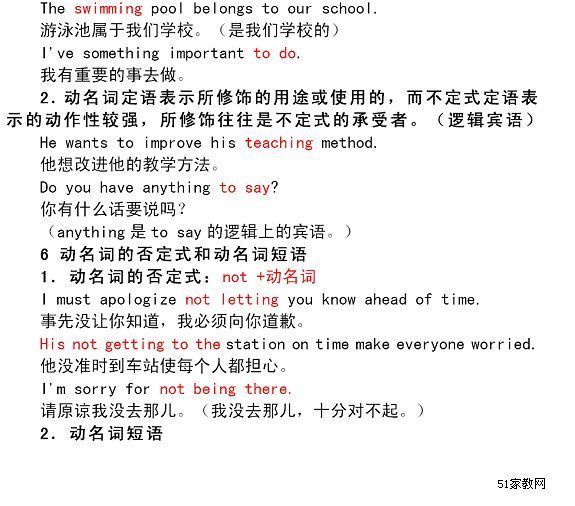

=We all worry about Mary going there alone.
我们大家都为玛丽独自去那儿感到担心。
3.有时动名词和动名词短语在句子中的意思有较大的不同,但大多数的情况下区别不大,只不过动名词短语表示的内容更具体一些。
比较
Do you mind opening the door?
劳驾你打开门好吗?
(句子的主语you 做这个动作)
Do you mind my(me)opening the door?
我打开门你介意吗?
(动名词短语中的动名词的逻辑主语me(my)来做这个动作)